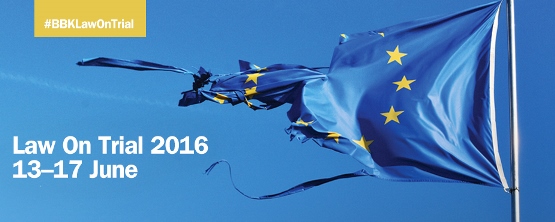This post was contributed by Michelle Everson, Professor of Law at Birkbeck. She has written widely on European Economic and Constitutional Law and has advised the European Commission, the European Parliament and the European Central Bank on matters of European Law.
Professor Everson is hosting a week long debate on ‘Europe at the Crossroads’ at Birkbeck (13-17 June). For details and to book your place, please visit the ‘European Law on Trial’ website.
Every day this week, Professor Everson writes for Birkbeck Comments, offering up her thoughts, opinions, and analysis on the EU referendum. Read part 1, part 2, part 3 and part 4 of her blog.

European borders: a paradoxical sting in the tail?
A couple of weeks ago, as we were stuck in Rome’s eternal traffic jam, an Italian Professor friend of mine told me a story I recognised, and not without a sliver of pain. In the early 1970s, his father, also an academic, took a sabbatical year at the University of London. Subject to his parents’ irrepressibly optimistic openness to the world, my friend found himself at one of the (little-lamented) Inner London Educational Authority’s finest primary school establishments in Richmond. He did so, however, without any local cultural knowledge, or indeed, being able to speak a word of English. The well-meaning school nonetheless stepped up to the European challenge and provided my friend with mentor, a little girl of mixed Italian-British heritage who might translate. The one problem in this arrangement was the fact that up until this time the little girl had done all in her power to hide her Italian heritage from her playmates, keeping her mother away from the school gates and denying all icons of culture that were not 100% British in origin. Her mortification was absolute. My friend’s embarrassment was total.
Being of much the same age and having grown up with a German mother in Chingford, I immediately recognised the pathology, though for some perverse reason (having a French name perhaps) I always followed a reverse psychology to dealing with the inevitable issues by flaunting my Germanness. No one who didn’t grow up in those grey and xenophobic days can truly understand the frustrations of living within the imagination-stagnation of a culturally-enclosed space, and worse still of a cultural space that seemed far past its sell-by date: Sunday afternoons of interminable repeats of British war films often found me pleading with the Luftwaffe Kommandant on the television not to give Douglas Baader his legs back. At a personal level, and even though I am sometimes shocked by lawlessness of the Italian-Polish mushroom wars now playing out in Epping Forest, I am grateful beyond measure that Europe is at home in London.
Yet, by the same tokens of location and age, I am also a middle-aged Londoner and wholly aware that the xenophobia of the 1970s and 1980s was not, or was not even primarily reserved for Europeans. As successive waves of immigrants from the Caribbean, from East Africa, from the Turkish communities of Cyprus, from Vietnam and from Latin America joined my world, the ineptitude of a UK television culture which persisted in a time warp that never allowed Germans to shed their Swastikas, paled into insignificance in the face of the ready offensiveness of British society towards what was perceived as the rest of the world. Those days are not yet over, but London is at least now more globally inclusive that it has ever been.
So what of Europe, with its by now painfully apparent, increasingly rigidly-enforced and often inhumane territorial borders? Is Europe now defining itself as a stagnant, culturally-enclosed space? This question is particularly relevant for a younger generation, with a heightened global outlook that makes little or any distinction between real or virtual friends in Sydney, Warsaw or Mombasa, or between market and cultural goods created in Beijing, Budapest or Rio de Janeiro. Is a concept of Europe a sustainable or even a just one in a globalising world? Within a social theory of European integration that identifies the only possible measure of a shared European culture as being that of the philosophical universalism which originated within the European Enlightenment, the question leads to the inevitably paradoxical conclusion that Europe can only ever be defined as Europe when it has dissolved itself in the success of its own universalising mission. Equally, from the altogether more pragmatic perspective of global economic development – or of the righting of the enduring structural wrongs of historically-engendered economic inequalities – is an ideational programme of European economic ordering a retrograde step and an act of global injustice?

Professor Michelle Everson
In this latter regard, I cannot overcome paradox, and can only answer within the realms of my own personal experience and outlook. For me, Europe is only an ideal and not a place. I do not belong to the Habermasian circle of democratic federalists. At the same time, I cannot but feel that, as in the case of EU Enlargement, a global market justice that is founded in the precept of competitive labour advantage, or the notion that I will correct my own disadvantaged position by working for less than you do, is not justice at all, but a recipe for the abasement of the whole of the human condition. If, in its tentative and messy mastery of the innate tensions between a human desire for economic opportunity and a human want for cultural security, the European Union manages to provide at least a hint of a new model for the globalised economy; if it reminds the world that markets must exist within rather than take dominance over society, it will have done more than we might ever have expected of it.
Law on Trial 2016: The European Union at the Crossroads, runs at Birkbeck from Monday 13 to Friday 17 June. Book a free place here.
Listen to Professor Everson on the topic of the EU referendum in the latest edition of Birkbeck Voices
This post represents the views of the author and not those of Birkbeck
Find out more


Wish I could be there to listen to Professor Everson engage the issues and the public. The excellent article above deserves a wider discourse and reflection. Thank you for posting this information.